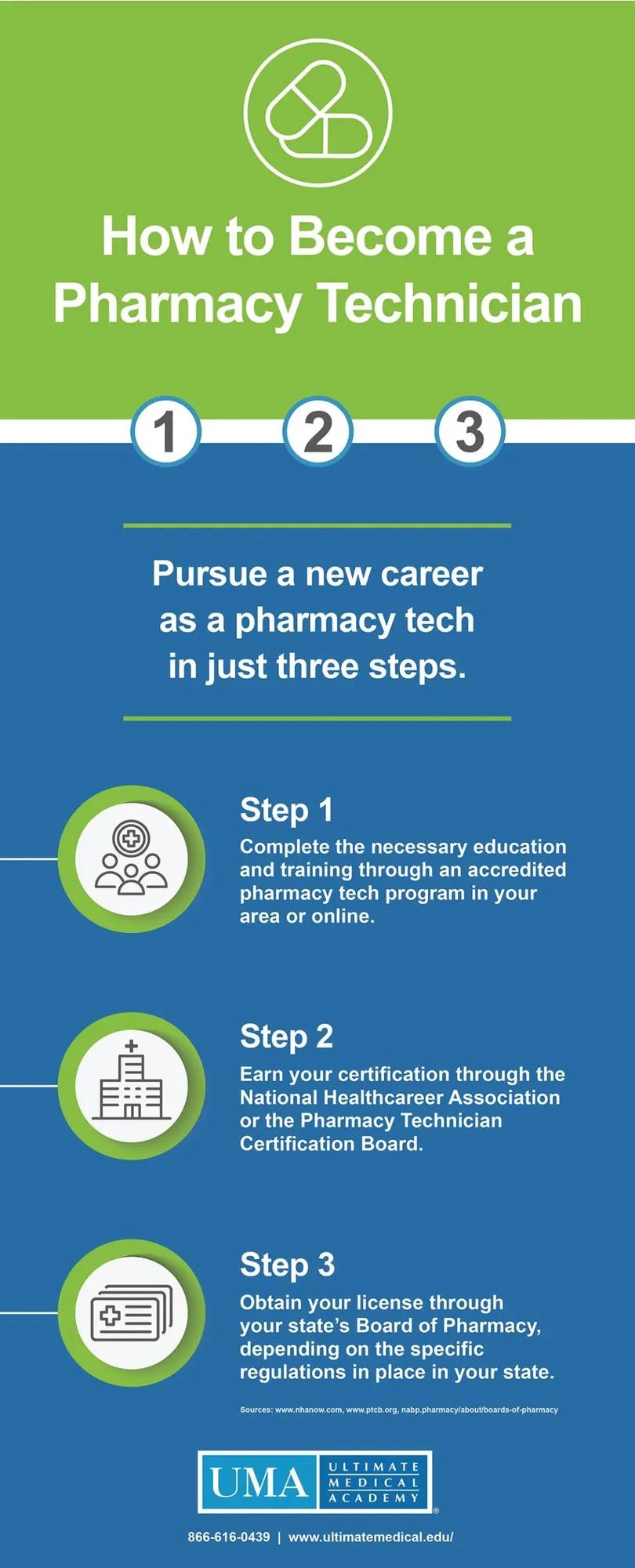How to Pursue Becoming a Pharmacy Technician in 5 Steps

Does a career in healthcare appeal to you? Perhaps you enjoy working with patients but don’t necessarily want to administer hands-on treatment. A career as a pharmacy technician could be exactly what you’re looking for.
In this guide, we will take you through pursuing the five steps of how to pursue becoming a pharmacy technician.
What is a Pharmacy Technician?
Under the direction of pharmacists, pharmacy technicians dispense medication, information, customer service, and support to customers. They work in a variety of settings, including retail pharmacies, compounding pharmacies, hospitals, and care homes.
What Do Pharmacy Technicians Do?
On top of processing prescription requests from patients, pharmacy technicians also handle prescription packaging and labeling.
Pharm tech job responsibilities include:
- Mixing medication compounds
- Packaging and labeling prescription medications
- Recording patient medical records
- Processing paperwork from health insurers
- Handling authorization requests for prescription refills
- Assisting with vaccinations
- Answering customer phone calls
- Measuring medications
Step 1: Identifying and Completing Training Program Options (if applicable)
The first step to pursuing a pharmacy tech career can be researching and applying for a pharm tech training program. Though some employers may only require a high school diploma, many states also regulate thisfield. So, completing a program and/or passing an exam may be required.
Key Skills for a Successful Career as a Pharmacy Technician
- Math, spelling, and reading
- Attention to detail as you will be filling prescriptions and working with chemical and drug names
- Basic knowledge of chemistry, biology, or health education
- Familiarity with medical terminology and scientific terms used in pharmacy
- Ability to work under pressure
- Good organizational skills
- Good customer service skills
- Good interpersonal skills and a good team player
- Take directions well, but can work independently when needed
Finding the Right Program to Pursue Your Pharmacy Technician Education
To become a pharmacy tech — a job in which you’ll play an important role in patients’ health — you may need to pass a certification exam and/or complete an educational program.
There are a variety of programs that prepare you for certification, from on-campus to remote programs that can be completed mostly online, so whatever your circumstances, you can choose the one that is right for you.
Successful completion of your diploma or degree program with certification prep can prepare you for the Pharmacy Technician Certification Exam (PTCE) offered by the Pharmacy Technician Certification Board (PTCB), which is often (but not always) a requirement for pharm tech roles.
Step 2: Prepare for the Pharm Tech Certification Exam
Finding out how to become a certified pharm tech can be one of the most important steps on your journey to becoming a qualified pharmacy technician.
What to Expect During Certification Preparation
Pharmacy technician certification programs generally cover the following subjects:
- Pharmacology
- Physiology
- Anatomy
- Pharmacy law and ethics
- Medical terminology
- Pharmaceutical calculations
- Healthcare systems
Complete Externship
As part of your pharmacy technician certification prep, you’ll likely be required to complete an on-site externship. Your instructors or school should help you connect with an appropriate externship site that will allow you to gain real-world experience.
Step 3: Take the PTCB Certification Test
Acquiring a PTCB certification, if eligible, is mandatory to work as a pharmacy technician in some states. In states where certification is not compulsory, employers might still prefer candidates with this certification.
Preparing for the Exam
Your pharm tech program should have given you the knowledge needed to pass the PTCB Certification exam. Ahead of the exam, you’ll want to spend time reviewing key topics.
Applying for the Exam
You must take the PTCB certification exam, if eligible, in-person by applying via the PTCB portal. It costs $129 to apply to take the exam.
Getting Certified
If you pass the exam, you are now a certified pharmacy technician. Congratulations, this is an important milestone on your journey to starting your career.
Step 4: Apply for a Job as a Pharmacy Technician
As a newly certified pharmacy technician, seeking entry-level roles within your field could be well supported by your certification.
Job Outlook for a Career as a Pharmacy Technician
According to the U.S. Bureau of Labor Statistics, the job market outlook for pharmacy technicians is good. The field has been projected to grow 4 percent (16,600 new jobs) through 2030. As the population ages, employment opportunities in the pharmaceutical industry in general are expected to grow about as fast as average for all occupations.
Choosing the Right Environment for You
Pharmacy technicians work in a wide range of environments, so it’s important to spend some time thinking about what you want to get from your future workplace.
If you’d like to work in a fast-paced environment, for instance, then you could seek out pharmacy technician jobs in hospitals, while those who want to make a real connection with patients could look for roles in care homes. Meanwhile, pharm techs talented in customer service should examine opportunities in retail pharmacies, while those with a passion for mixing drugs could consider a compounding pharmacy.
Step 5: Continued Education
While certification is an important step in your pharmacy technician career journey, it’s by no means the end of your education.
Keeping Up to Date with New Medications
Pharmacy technicians are tasked with keeping up to date with new medications. It’s essential that graduates maintain knowledge of changes in the industry, with new drugs and brands constantly entering the market.
Renewing Your PCTB Certification
Certified Pharmacy Technicians (CPhTs) must renew their certification every two years. This ensures that pharmacy technicians stay on top of any changes to the industry through required continued education. Failure to renew your certification means you are no longer PCTB-certified and must immediately stop identifying yourself with this credential.
Long Story Short? The Process Simplified
Broken down, basic steps for how to pursue becoming a pharmacy tech are as follows:
The Stages of a Pharmacy Technician
- Completion of a pharm technician educational program, if desired or required by your state or desired employer
- 2. Preparing for the PTCB certification exam (if required by your state or potential employer)
- Passing the PTCB certification exam (if required by your state or potential employer)
- Applying for and being hired for a pharmacy technician role
- 5. Completion of continuing education throughout your career and renewing PCTB certification every two years if applicable
If you’re ready to start your journey to becoming a fully qualified pharmacy tech, you may want to decide which pharm tech program works best for you. At Ultimate Medical Academy, you can complete a Health Sciences – Pharmacy Technician associate degree mostly online.
As well as giving you the knowledge and skills for entry-level roles in the field, UMA prepares you to take the PTCB certification exam, and includes an on-site externship that gives you real-world experience.
Request Information
Talk with us. Start your journey.
Complete this form and we'll call you to explore options at UMA and answer your questions. We'll also email you info on how to get started. We're with you at every step!
Request Information
Talk with us. Start your journey.
Complete this form and we'll call you to explore options at UMA and answer your questions. We'll also email you info on how to get started. We're with you at every step!
About the Author
 Christina DeBusk
Christina DeBuskChristina DeBusk is a freelance writer who has been providing health and wellness content to healthcare organizations such as the American Chiropractic Association and International Sports Sciences Association (ISSA) since 2011. She obtained her Bachelor of Science in Sociology from Central Michigan University, minoring in psychology. She has also earned several ISSA certifications, including Certified Personal Trainer and Certified Nutrition Specialist, achieving the status of Elite Trainer.
Related Content



